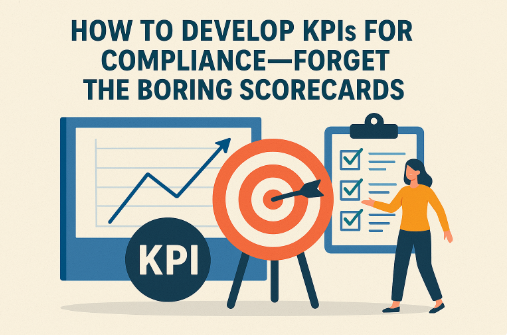What are compliance KPIs?
Compliance key performance indicators, or KPIs, are metrics that help you measure how successful your compliance performance is in relation to your strategic goals. These include how compliant your organization is in its internal and external policies as well as in terms of the regulatory landscape in which you work.
When most businesses describe compliance KPIs, they imagine a dusty spreadsheet: audits passed, incidents reported, and the percentage of employees who clicked through the e-learning.
Tidy. Immaculate. And utterly ineffective in actually driving a culture of compliance.
The issue? Most compliance KPIs are crafted to keep managers comfortable instead of telling uncomfortable truths. They track the easy, not the meaningful. If your KPIs are in existence merely to please the boardroom and check the box with the regulators, you’re not running compliance—you’re running optics.
Talking about the evolution of compliance KPIs with teeth.
1.Don’t Count the Wrong Things
Traditional compliance KPIs often track outputs instead of outcomes. Example:
Weak KPI: “95% of employees completed anti-bribery training.” Actual KPI: “Zero procurement transactions referred for potential bribery risk under third-party review.”
That is, don’t merely count who came to class—assess if they altered their behavior. If somebody nails a test yet still fudges the math on expense reports, your KPI is a feel-good illusion.
2. Make Your KPIs Uncomfortable on Purpose
Here’s the controversial part: Good compliance KPIs should make you sweat a little. If all of your metrics are “green” year after year, you’re most likely tracking safely inside your comfort zone—or worse, concealing the truth.
Include KPIs that could reveal inconvenient truths:
- Time elapsed between violation of policy and correction.
- Proportion of leadership decisions reviewed by the compliance teams.
- Number of anonymous hotline calls that result in genuine investigations.
These are not “how wonderful are we” figures. These are “where are our weaknesses?” figures.
3. Deal with KPIs as Smoke Alarms, Not Trophies
A KPI is not a badge of honor but a warning tool. It is not there to live in the annual report in the guise of a shiny “100% compliant” badge but to tell you when the house might be on fire.
Ask yourself:
- Would this measure warn me prior to the scandal?
- Does it detect early warning signs rather than after-the-incident cleanups?
If your KPI only measures after a law has been violated, you’re not measuring compliance—you’re measuring failure.
4. Go Beyond the Compliance Department’s Borders
Far too many organizations track metrics of compliance within the compliance function—how many audits the compliance group conducted, how much training the group delivered—without asking about the rest of the organization’s behavior.
Better: embed compliance KPIs into the very center of operations, sales, procurement, and even marketing. Track such things as:
- Percentage of suppliers meeting environmental and labor standards.
- Number of contracts rejected for regulatory non-compliance before signature.
- Approved and reviewed consumer law risk marketing campaigns before launch.
If compliance is everyone’s problem, the KPIs should live everywhere.
5. Measure Integrity, Not Just Rule-Following
This is where it gets tricky: the most effective compliance cultures are based on values, not fear. When employees are complying only
Because they fear being caught, your compliance program is weak.
Yes, of course, you must have “hard” KPIs such as audit pass rates. But also measure “soft” indicators:
- Employee perception surveys on ethical climate.
- Readiness to raise one’s concerns without fear of retribution.
- Instances where leadership voluntarily chose the ethical option over the profitable one.
These are harder to measure—but they’re also the ones that show if compliance is truly alive in your company.
6. Create KPIs to Develop
Regulations change. Risks change. Scandals surprise even the most careful companies. If your KPIs stay frozen, they’ll become obsolete.
Every quarter, ask:
- Has a new law altered the landscape of compliance?
- Have we seen emerging risks in our industry?
- Do our KPIs remain in sync with the real world, or are they trapped in yesterday’s news cycle?
Your most dangerous KPI is the one you keep monitoring long after the KPI has stopped providing you with useful information.
The Bottom Line—KPIs Should Tell the Ugly Truth
Too many KPIs for compliance are like photos of yourself with a flattering filter—they are pretty on paper but mask the imperfections. That’s corporate vanity, not corporate governance.
If you desire KPIs that really look out for your organization, you must be prepared to measure the uncomfortable things, reveal the hidden things, and do the things you find out. Since in complacency, the most hazardous figure is zero occurrences—not because it’s unattainable, but because it’s nearly always the result of the world not being searched strenuously enough.
References
[1] M. Kral, Measuring Compliance Effectiveness: Compliance KPIs That Work. Compliance Week, 2021. [Online]. Available: https://www.complianceweek.com
[2] Deloitte, “Compliance Risk Assessments: The Third-Party Perspective,” Deloitte Insights, 2020. [Online]. Available: https://www2.deloitte.com
[3] T. Fox, Best Practices in Compliance Program Effectiveness Measurement. FCPA Compliance Report, 2022. [Online]. Available: https://www.fcpacompliancereport.com
[4] PwC, “State of Compliance Study,” PwC, 2021. [Online]. Available: https://www.pwc.com
Penned by Shrutt
Edited by Seema Acharya, Research Analyst
For any feedback mail us at info@eveconsultancy.in
Finance made simple, fast, and fun! 🏦💡 Sign up for your daily dose of financial insights delivered in plain English. In just 5 minutes, you’ll be smarter already!
Simplify Your Business Compliance with Eve Consultancy
Eve Consultancy is your trusted partner for end-to-end compliance services, including Company Incorporation, GST Registration, Income Tax Filing, MSME Registration, and more. With a quick and hassle-free process, expert guidance, and affordable pricing, we help businesses stay compliant while they focus on growth. Backed by experienced professionals, we ensure smooth handling of all your legal and financial requirements. WhatsApp us today at +91 9711469884 to get started.

